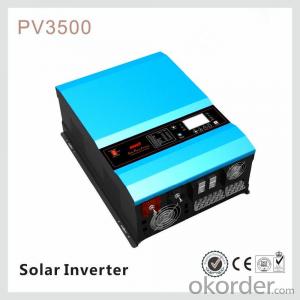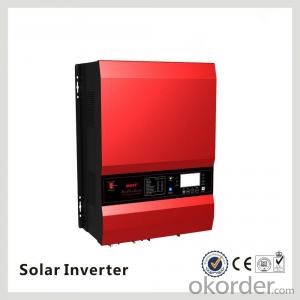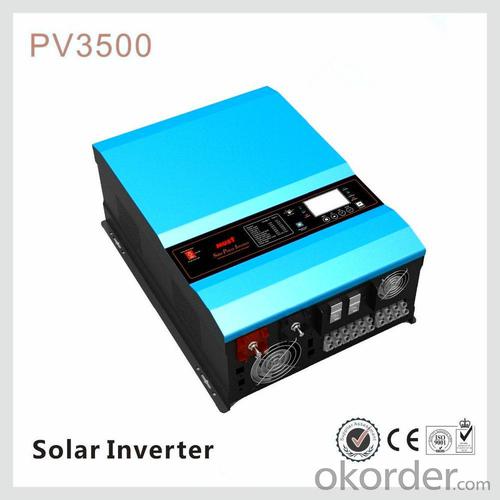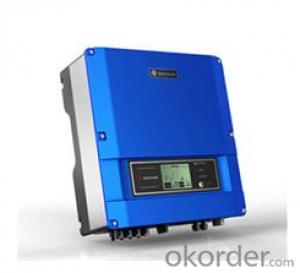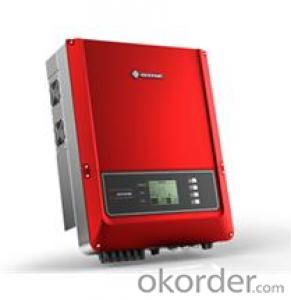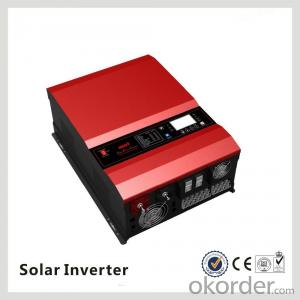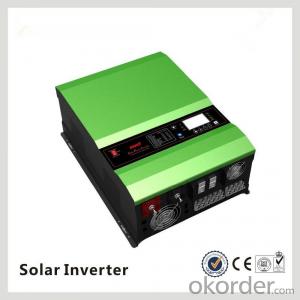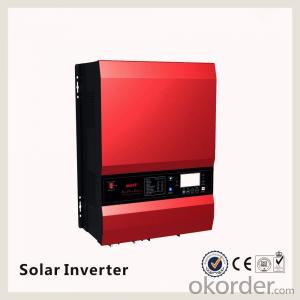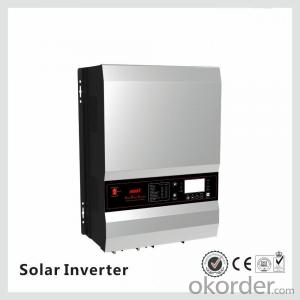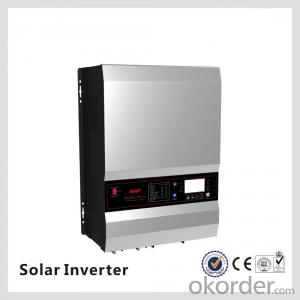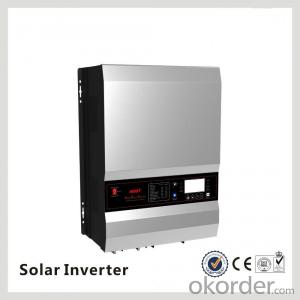24 Volt Solar Inverter PV35-6K Low Frequency DC to AC Solar Power Inverter 12KW
- Loading Port:
- Shanghai
- Payment Terms:
- TT OR LC
- Min Order Qty:
- 10000 watt
- Supply Capability:
- 100000 watt/month
OKorder Service Pledge
OKorder Financial Service
You Might Also Like
Product Description
What is Solar inverter?
Solar pv inverters is an electronic system that operates the photovoltaic(PV) modules in a manner that allows the modules to produce all the power they are capable of. The solar mate charge controller is a microprocessor-based system designed to implement the MPPT. It can increase charge current up to 30% or more compared to traditional charge controllers.
Features
· Power range 1KW - 12KW
· Inbuilt pure copper transformer
· Powerful charge rate up to 100Amp
· MPPT solar charge controller 45A 60A (120A Option)
· PV input:145V max
· 12V/24V/36V/48V auto work
· MPPT efficiency>99% , Peak conversion efficiency>98%
· DSP processors architecture ensure high speed and performance
· Four-stages charging mode
· Protection: PV array short circuit, PV reverse polarity, Battery reverse polarity, Over charging, Output short circuit
· High efficency design & "Power Saving Mode" to coverse energy
Specification
MODEL | PV35-1K | PV35-2K | PV35-3K | PV35-4K | |||||||||||||||
Default Battery System Voltage | 12VDC | 24VDC | 12VDC | 24VDC | 12VDC | 24VDC | 12VDC | 24VDC | |||||||||||
INVERTER OUTPUT | Rated Power | 1KW | 2KW | 3000VA/2.4KW | 4000VA/3.2KW | ||||||||||||||
Surge Rating (20ms) | 3KW | 6KW | 9KW | 12KW | |||||||||||||||
Capable Of Starting Electric Motor | 1HP | 1HP | 1.5HP | 2HP | |||||||||||||||
Waveform | Pure sine wave/ same as input (bypass mode) | ||||||||||||||||||
Nominal Output Voltage RMS | 100V/110V/120VAC 220V/230V/240VAC(+/-10% RMS) | ||||||||||||||||||
Output Frequency | 50Hz/60Hz +/-0.3 Hz | ||||||||||||||||||
Inverter Efficiency(Peak) | >88% | ||||||||||||||||||
Line Mode Efficiency | >95% | ||||||||||||||||||
Power Factor | 0.8 | ||||||||||||||||||
Typical Transfer Time | 10ms(max) | ||||||||||||||||||
AC INPUT | Voltage | 230VAC | |||||||||||||||||
Selectable Voltage Range | 96~132VAC/155~280VAC(For Personal Computers) | ||||||||||||||||||
Frequency Range | 50Hz/60Hz (Auto sensing) 40-80Hz | ||||||||||||||||||
BATTERY | Minimum Start Voltage | 10.0VDC /10.5VDC for12VDC mode (*2 for 24VDC, *4 for 48VDC) | |||||||||||||||||
Low Battery Alarm | 10.5VDC+/-0.3V for12VDC mode (*2 for 24VDC, *4 for 48VDC) | ||||||||||||||||||
Low Battery Cutoff | 10.0VDC+/-0.3V for12VDC mode (*2 for 24VDC, *4 for 48VDC) | ||||||||||||||||||
High Voltage Alarm | 16.0VDC+/-0.3V for12VDC mode (*2 for 24VDC, *4 for 48VDC) | ||||||||||||||||||
High Battery Voltage Recover | 15.5VDC+/-0.3V for12VDC mode (*2 for 24VDC, *4 for 48VDC) | ||||||||||||||||||
Idle Consumption-Search Mode | <25W when power saver on | ||||||||||||||||||
CHARGER | Output Voltage | Depends on battery type | |||||||||||||||||
Charger AC Input Breaker Rating | 10A | 30A | 30A | 30A | |||||||||||||||
Overcharge Protection S.D. | 15.7VDC for 12VDC mode (*2 for 24VDC, *4 for 48VDC) | ||||||||||||||||||
Maximum Charge Current | 45A | 25A | 70A 35A | 90A 50A | 65A 40A | ||||||||||||||
BTS | Continuous Output Power | Yes Variances in charging voltage & S.D. voltage base on the battery temperature | |||||||||||||||||
BYPASS & PROTECTION | Input Voltage Waveform | Sine wave (grid or generator) | |||||||||||||||||
Nominal Input Frequency | 50Hz or 60Hz | ||||||||||||||||||
Overload Protection (SMPS Load) | Circuit breaker | ||||||||||||||||||
Output Short Circuit Protection | Circuit breaker | ||||||||||||||||||
Bypass Breaker Rating | 10A | 15A | 20A | 40A | |||||||||||||||
Max Bypass Current | 30Amp | ||||||||||||||||||
SOLAR CHARGER | Maximum PV Charge Current | 45A | |||||||||||||||||
DC Voltage | 12V/24V atuo work | ||||||||||||||||||
Maximum PV Array Power | 600W | 1200W | 600W | 1200W | 600W | 1200W | 600W | 3200W | |||||||||||
MPPT Range @ Operating Voltage(VDC) | 16-100VDC for 12V mode,32-100V for 24V mode | ||||||||||||||||||
Maximum PV Array Open Circuit Voltage | 100VDC | 147VDC | |||||||||||||||||
Maximum Efficiency | >98% | ||||||||||||||||||
Standby Power Consumption | <2w< span=""> | ||||||||||||||||||
MECHANICAL SPECIFICATIONS | Mounting | Wall mount | |||||||||||||||||
Dimensions (W*H*D) | 493*311*215mm | ||||||||||||||||||
Net Weight (Solar CHG) kg | 23.5 | 24.5 | 25.5 | 29.5 | |||||||||||||||
Shipping Dimensions(W*H*D) | 580*400*325mm | ||||||||||||||||||
Shipping Weight (Solar CHG) kg | 25.5 | 26.5 | 27.5 | 31.5 | |||||||||||||||
OTHER | Operation Temperature Range | 0°C to 40°C | |||||||||||||||||
Storage Temperature | -15°C to 60°C | ||||||||||||||||||
Audible Noise | 60dB MAX | ||||||||||||||||||
Display | LED+LCD | ||||||||||||||||||
Loading(20GP/40GP/40HQ) | 150pcs/300pcs/350pcs | ||||||||||||||||||
Images
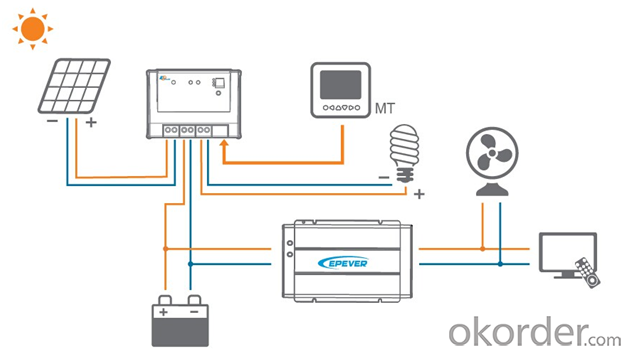
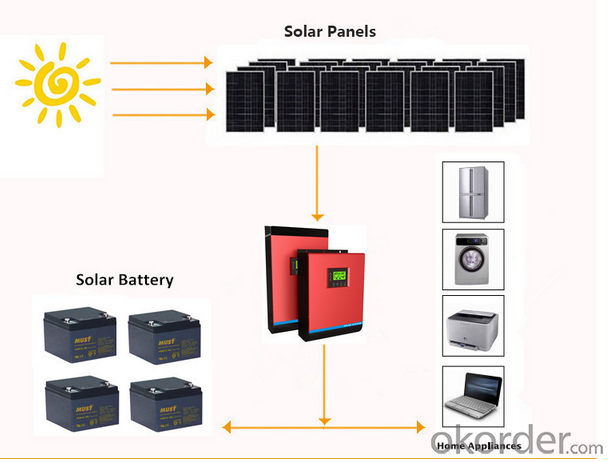
Packaging & Shipping
What is the packing?
1.Package: Carton Box for packaging, or Wooden Box advised for Samples to protect in transportations. Package designed by Clients is welcomed.
2.Shipping: DHL,FEDEX,UPS,EMS,AirWay and By Sea.
3.Payment: T/T( telegraphic transfer (T/T) and Western Union
4.Welcome to your Sample Order to test First.
FAQ
Q1: How to choose a right inverter?
A1:Tell us your demand, then our sales will recommend a suitable inverter to you.
Q2: What's the different between inverter and solar inverter?
A2: Inverter is only accept AC input, but solar inverter not only accept AC input but also can connect with solar panel to accept PV input, it more save power.
Q3: How about the delivery time?
A3: 7 days for sample; 25 days for bulk order.
- Q: What is the role of a power backup system in a solar inverter?
- The role of a power backup system in a solar inverter is to provide a reliable source of energy during periods of low or no sunlight. This backup system, usually in the form of batteries, stores excess energy generated by the solar panels and allows it to be used when the solar energy production is insufficient or unavailable. It ensures a continuous and uninterrupted power supply, even during grid outages or at night, making the solar inverter system more reliable and versatile.
- Q: Can a solar inverter be used with battery storage?
- Yes, a solar inverter can be used with battery storage. In fact, it is commonly used in solar energy systems to convert the direct current (DC) power generated by solar panels into alternating current (AC) power that can be used by household appliances or stored in batteries for later use. The solar inverter plays a crucial role in managing the flow of electricity between the solar panels, batteries, and the electrical grid, ensuring efficient energy utilization and storage.
- Q: Can a solar inverter be used in standalone power systems?
- Yes, a solar inverter can be used in standalone power systems. Standalone power systems, also known as off-grid systems, are designed to operate independently from the main electrical grid. Solar inverters play a crucial role in these systems by converting the direct current (DC) electricity generated by solar panels into alternating current (AC) electricity that can be used to power appliances and devices. Thus, solar inverters are essential components in standalone power systems, enabling the use of solar energy for off-grid electricity needs.
- Q: How does a solar inverter handle islanding detection and prevention?
- A solar inverter handles islanding detection and prevention by continuously monitoring the electrical grid's stability. It utilizes anti-islanding protection mechanisms to detect any abnormal conditions, such as voltage fluctuations or frequency deviations, that may indicate the presence of an islanded grid. In the event of islanding, the inverter immediately disconnects from the grid to prevent energy feed-in and effectively isolate the solar system. This ensures the safety of utility workers, prevents damage to equipment, and helps maintain the stability of the overall electrical grid.
- Q: What is the difference between a central inverter and a string inverter?
- A central inverter is a type of inverter that is used in large-scale solar installations. It takes the direct current (DC) electricity generated by multiple solar panels and converts it into alternating current (AC) electricity that can be used to power homes or businesses. A central inverter is typically located in a central location, such as a utility room or basement. On the other hand, a string inverter is a type of inverter that is used in smaller-scale solar installations. It also converts DC electricity from multiple solar panels into AC electricity, but it does so at the string level. This means that each string of solar panels has its own dedicated inverter. String inverters are usually installed near the solar panels themselves, which can make them more convenient for maintenance and troubleshooting. In summary, the main difference between a central inverter and a string inverter is the scale of the solar installation they are used in and their physical location. Central inverters are used in larger installations and are located centrally, while string inverters are used in smaller installations and are located near the solar panels.
- Q: How does a solar inverter handle reactive power compensation?
- A solar inverter handles reactive power compensation by integrating power factor correction techniques. It actively monitors the power factor of the connected load and adjusts the reactive power flow accordingly. This ensures that the inverter delivers a balanced combination of active (real) power and reactive power, resulting in improved system efficiency and reduced power losses.
- Q: How is a solar inverter connected to the solar panels?
- A solar inverter is connected to solar panels through a direct current (DC) connection. The DC power generated by the solar panels is sent to the inverter, which converts it into alternating current (AC) power that can be used to power electrical devices or be fed into the grid.
- Q: Can a solar inverter be used with a solar-powered water desalination system?
- Yes, a solar inverter can be used with a solar-powered water desalination system. A solar inverter is responsible for converting the DC power generated by solar panels into AC power that can be used by electrical devices. In the case of a solar-powered water desalination system, the solar panels generate DC power, which is then converted into AC power by the inverter to run the system's pumps, filters, and other electrical components. This allows the system to operate efficiently using clean and renewable energy from the sun.
- Q: Is the PV inverter a current source or a voltage source?
- The inverter is mainly composed of a switching element such as a transistor, and turns the DC input into an AC output by repeatedly turning ON-OFF the switching element in a regular manner.
- Q: What is the role of a solar inverter in a solar-powered electric fence?
- The role of a solar inverter in a solar-powered electric fence is to convert the direct current (DC) generated by the solar panels into alternating current (AC) that is used to power the electric fence system. The inverter ensures that the energy captured by the solar panels is transformed into a usable form for the electric fence, allowing it to function efficiently.
Send your message to us
24 Volt Solar Inverter PV35-6K Low Frequency DC to AC Solar Power Inverter 12KW
- Loading Port:
- Shanghai
- Payment Terms:
- TT OR LC
- Min Order Qty:
- 10000 watt
- Supply Capability:
- 100000 watt/month
OKorder Service Pledge
OKorder Financial Service
Similar products
Hot products
Hot Searches
Related keywords
